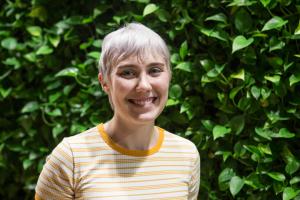From biologists following fish to political scientists tracking dark money, seven Columbian College of Arts and Sciences (CCAS) PhD students were among the 2019 winners of the prestigious National Science Foundation (NSF) Graduate Research Fellowship.
The country’s oldest nationwide fellowship program, the award recognizes “outstanding” graduate students in the science, mathematics, engineering and social science fields. Each of the 2,000 fellows selected annually receive a three-year stipends of $34,000 along with a $12,000 education allowance for tuition and fees. Past recipients have included 42 Nobel laureates, more than 450 National Academy of Sciences members and leaders across government, industry and academia.
“We are extremely proud of these doctoral students, who are taking their passion for discovery to new levels through their research,” said CCAS Interim Dean Paul Wahlbeck. “To receive this fellowship—one of the top markers of exceptional scholarship in the field—speaks volumes about the caliber of our students.”
Read More About the CCAS 2019 Fellows:
Dario Verta, Mathematics
Even to his fellow mathematicians, third-year PhD student Dario Verta has trouble explaining the scribbles and loops he scrawls across whiteboards, iPads and sometimes his bathroom mirror.
Verta is drawing geometric forms twisted into impossible shapes—theoretical objects that only exist in the nonexistent fourth dimension. They include Klein bottles (containers that fold in on themselves so they technically have no inside or outside) and Möbius strips (one-sided closed-curves). And while they may baffle anyone unfamiliar with mathematical topology, his calculations have implications for string theory, quantum physics and scientists studying gravity, black holes and the fabric of the universe. “We are looking at unsolvable problems,” Verta said.
Verta was converted to theoretical mathematics in a seminar with Professor of Mathematics Valentina S. Harizanov. As an NSF fellow, he’ll continue drawing reality-defying figures—but with computer coding instead of his mirrors. “They say mathematicians use grants for paper and pencils,” he joked. “But we actually spend it on computers.”
Allyson Evans, Biological Sciences
For first-year PhD student Allyson Evans, the weirder the fish, the better. She studies the kind of animals you don’t find in children’s fish tanks: hingemouths with giant snouts in their foreheads; elephantfish that generate electric shocks; and zebrafish with bizarre anatomical structures that connect their ears to their bladders.
“Fish are incredibly diverse—the most diverse vertebrates of all—and they have endlessly [interesting] abnormalities,” she said.
Evans’ research will trace odd fish features for clues to morphology mysteries. Working in Professor of Biology Patricia Hernandez’s Science and Engineering Hall lab, she has access to anomalies like small-jawed butterflyfishes and wide-gilled paddlefishes. Using CT scanning technology, she will also study collections at the Smithsonian and the American Museum of Natural History.
Evans’ research has implications across fields from ocean ecology to human economies. For example, she noted, zebrafish anatomy studies have led to research on infant cranial deformities. “Fish diversity directly affects lives,” she said.
Ahmed Kodouda, Political Science
Ahmed Kodouda emigrated from war-torn Sudan to the United States at age 11. But the third-year doctoral student has frequently returned to Africa, working with NGOs on conflict resolution. “I grew up where civil war was the norm,” he said.
As an NSF fellow, Kodouda will again travel to the Horn of Africa to investigate why some rebel movements fragment while others remain stable. He will compare two case studies: Eritrea, which forged a unified government after gaining its independence from Ethiopia in 1991; and South Sudan, where rebels in the 2011 break-away nation ended up fighting among themselves.
Based on his past studies, Kodouda theorizes that post-conflict splits hinge on different international support routes. Eritreans, for example, felt accountable to Diasporan citizens abroad who donated 2 percent of their income, he maintained. South Sudanese rebels received money from various governments, fostering corruption that splintered their forces. Fluent in Arabic, Kodouda will interview conflict veterans to try to better understand the success and failure of these movements. “My goal is to produce rigorous empirical research and accurately convey the story of these people,” he said.
Kristen Tuosto, Anthropology
When asked why she studies baboon bones in Kenya, third-year PhD student Kristen Tuosto goes back to her childhood in California. At 7, Tuosto was hit by a car outside her San Bernardino home. She was OK. In fact, she didn’t break a single bone. Later, her sister tripped over a bicycle—and broke her leg in two places.
“Since then, I’ve been fascinated by how some bones are different than others,” Tuosto said
Her curiosity led her to Kenya’s primate graveyards with Associate Professor of Anthropology Shannon McFarlin, an expert on bone histology. As an NSF fellow, Tuosto will examine the skeletons of baboons who survived droughts at an early age. She will investigate how malnutrition from ravaged plant supplies affected their bone growth. Her research may directly relate to poor nutrition and bone health in human children “I used to think humans were so unique. But we are not,” she said. “It’s not a stretch to say baboons can tell us a lot about people.”
Elizabeth Meehan, Political Science
As an undergraduate researching transparency in public policy, Elizabeth Meehan uncovered data on government malfeasance. But when she turned her attention to finding the hidden powers behind shell corporations and big business deals, she was shocked by the layers of secrecy she encountered. “These people really do not want you to know their names,” said the third-year PhD student.
As an NSF fellow, Meehan is exposing beneficial ownerships—people who secretly reap the profits of businesses without being listed as their actual owners. The system can be a money laundering shield and a haven for concealing terrorist funds.
With the guidance of Assistant Professors of Political Science David Szakonyi and Henry Farrell, Meehan is examining European Union laws regulating beneficial ownership while collecting data on how the legal loopholes benefit tax evasion schemes. “This is about economic inequality,” she said, “because when the super rich hide their wealth, it deflates national tax revenues, which the rest of us have to make up.”
Rebecca Clement, Biological Sciences
Even for a self-described “bug person” who studied dragonflies as an undergraduate, Rebecca Clement didn’t initially feel comfortable with termites. When Associate Professor of Biology Amy Zanne recruited the third-year PhD student for a project on wood decomposition in Australia, “I was turned off by working with termites,” Clement said.
Now Clement is a full-fledge termite convert. She’s not only a fount of termite trivia—she’s quick to point out that only 80 of 3,000 termite species actually snack on houses—she’s also shifted her research focus to the vital role termites play in breaking down trees into nutrients for soil microbes, plants and animals. “If it weren’t for termites, we’d be sitting in huge piles of dead wood,” Clement said.
For her NSF research, Clement will continue exploring termite diversity in Australia, home to almost 300 species. In five sites, she’ll track termites through deserts, grasslands and rainforests to document how their threatened extinction would dramatically impact the environment.
Rachel Nelson, Anthropology
As a research intern at Chicago’s Lincoln Park Zoo, first-year PhD student Rachel Nelson gained first-hand experience observing humankind’s closest living relative—chimpanzees. A primatology researcher, she had long been fascinated by the complex social lives and intellectual abilities of chimps. Interacting with primates, she was continually struck by their genetic and behavioral similarities to humans.
For her NSF fellowship, Nelson’s research will take her to the Gombe National Park in Tanzania where, alongside Associate Professor of Anthropology Carson Murray, she will study lactating chimpanzees. Human women are more likely to be dehydrated during lactation, Nelson noted, but that same condition has never been explored in chimpanzees and other primates. Nelson will collect behavioral and dietary data to see if lactating chimps are consuming more water in response to dehydration. “Understanding how chimpanzees are affected by the lactation burden and the extent to which they can compensate behaviorally has the potential to transform our understanding of the same in early human ancestors,” she said.
Photos: Long Nguyen









